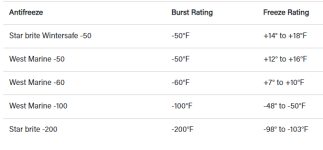The basic problem with raw water cooling and running in antifreeze is this:
your cooling system has excess capacity to cool the engine and exhaust,
the manifolds & elbows get full flow from the 'stat housing (except in Merc warm manifolds, not until the 'stat opens) and the engine 'stat, opens and closes to maintain its set temp. The engine 'stat functions a gate valve.
So if the engine is idling on a cool fall day, it is unlikely to open all the way to allow a full exchange of AF, due to the block still being full of water. There is no load on the engine to build heat in the water, so the stat stays closed or mostly closed. Remember for the stat to open the water has to get hot, for the water to get hot, the engine has to be under load. Idling is not putting the engine under any load. My engine idles at 160* and the manifolds and elbows are only at 90-100* F, at idle, hardly warm. You will wind up with AF in the exhaust and a diluted (but unknown & probably inadequate) concentration of AF in the block.
People will say, but I saw pink coming out the exhaust....yes you did but that was all or mostly by passing the engine, because the engine is not hot enough to open the stat!
This is why you should choose one of these options:
drain it all down, and leave it, some prefer this....
drain it all down and back fill with AF via the hoses....I like this....
drain the block and then run in the AF....to me not worth it, if you're draining just back fill!
I prefer manual drain and manual fill, you know it's drained, and manual fill is less messy and uses less AF and there is no chance of burning the impeller if you don't suck up the AF fast enough because remember the water hose puts water in under pressure, the AF is gravity feed unless you put a pump on your winterizing tank.
As I said in a previous post, marine AF is rated in terms of burst temp not freeze temp. What that means is the AF will get hard at a certain temp but not expand. Having said that, I do not like the idea of AF getting hard in a cast iron block, so you want to go by FREEZE temp not Burst temp. Safer!




















